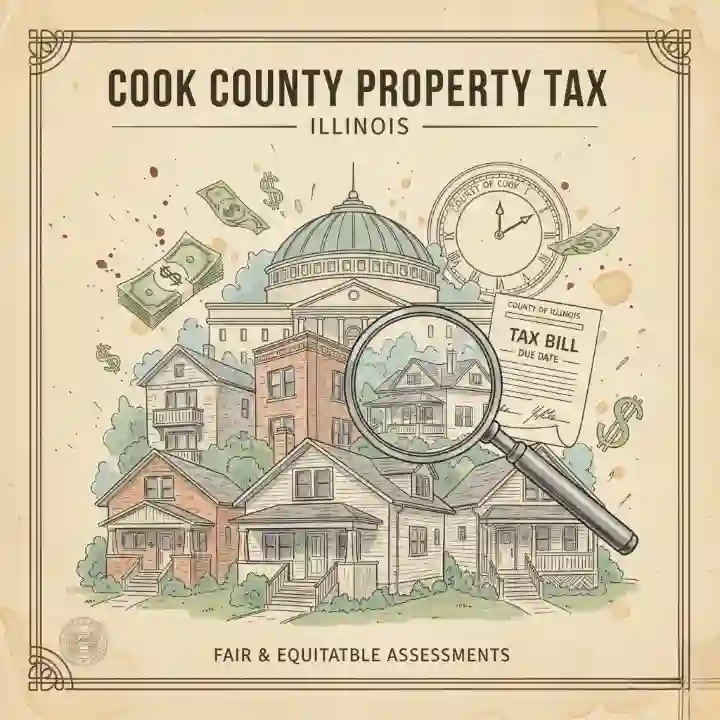Introduction
Imagine juggling holiday preparations while unexpectedly confronting a hefty property tax bill arriving late into your mailbox. That’s been the unsettling experience for many Cook County residents as the 2025 property tax bills faced unusual delays and were mailed just weeks before the December 15 due date. The phrase “Cook County property tax bill December 15 2025 delay holiday stress” captures the financial and emotional pressures mounting amid year-end festivities.
This article sheds light on why the delay occurred, its financial and psychological impact on taxpayers and local governments, and practical guidance to navigate this unique scenario confidently. By breaking down the situation in clear, relatable terms, readers gain a solid understanding no matter their familiarity with taxation.
Why Cook County’s Property Tax Bill Delay Matters
Cook County collects property taxes on behalf of nearly 20 local taxing districts including Chicago Public Schools, municipalities, and park districts, generating around $18.3 billion annually one of the largest tax bases in the United States.
This year, due to a decade-old contract with a Texas-based software vendor, Tyler Technologies, critical modernization efforts hit unexpected snags, pushing the mailing of tax bills from the usual August timeframe to mid-November. The compressed timeline leaves homeowners only until December 15 to make payments a mere month or so after receiving bills.
This rush strains household budgets, complicates holiday spending decisions, and stresses local governments relying on timely revenues for public services. For instance, Chicago Public Schools borrowed $450 million to bridge funding gaps caused by delayed tax collections, incurring millions in interest expenses for fiscal 2026.
Experience and Real-World Insights
Homeowners report blending surprise with anxiety. Many organize bills alongside holiday cards and gifts, feeling the pressure of unexpected financial obligations. One Cook County resident shared, “The late bill felt like a sneak attack right before the holidays. We’ve had to postpone some holiday plans to cover taxes.”
Financial advisors recommend reassessing monthly budgets and considering payment plans to ease cash flow issues. For landlords and investors holding multiple properties, coordinating staggered payments becomes essential to avoid penalties and maintain investment health.
Local taxing district officials acknowledge the burden but emphasize cooperation and options like extended payment plans to assist affected taxpayers.
Breaking Down the Tax System and Delay Simply
-
Biannual Billing: Cook County bills property taxes in two installments per year, typically due in March and August.
-
Delayed Mailing: In 2025, the second installment bills were sent nearly four months late due to software contract and modernization issues.
-
Payment Deadline: To compensate, the county pushed the extended due date to December 15, 2025.
-
Impact on Budgets: This delay compressed the collection period and forced borrowing by taxing districts to fund ongoing operations.
-
Future Adjustments: The next year’s installment schedule is expected to move, with the first 2026 installment due no earlier than April 2026, relieving some pressure.
Understanding these elements helps residents contextualize billing changes and adjust finances accordingly.
Strategies for Taxpayers and Investors
-
Check Your Bill Online Early: Use the Cook County Treasurer’s website to access your tax details as soon as possible.
-
Explore Payment Plans: Inquire about installment options or relief programs to spread costs.
-
Prioritize Payments: Balance tax dues against other financial obligations, leveraging budgeting tools.
-
Monitor Updates: Stay informed about any changes in billing or due dates through official channels.
-
Engage Financial Advisors: Use professional advice for managing cash flow, especially if juggling multiple properties.
Proactive steps help reduce stress and financial strain.
Common Mistakes and How to Avoid Them
-
Ignoring the New Deadline: Assuming old schedules can lead to late fees and interest.
-
Overextending Holiday Spending: Balancing gift purchases with tax dues prevents cash shortages.
-
Delaying Bill Review: Prompt attention allows time for clarifications or appeals.
-
Underestimating Tax Burden Increases: Property tax rates in Cook County have grown faster than home values; plan accordingly.
Avoiding these pitfalls safeguards credit and peace of mind.
Conclusion
The “Cook County property tax bill December 15 2025 delay holiday stress” event illustrates the challenges of system modernization in vital public finance functions and its human impact. Despite the inconvenience, the county’s efforts to deliver bills and support residents through payment options demonstrate responsiveness.
For business and finance readers, grasping this delay helps manage personal or portfolio risk tied to real estate holdings and regional economic trends.
Stay connected with local tax authorities, leverage available resources, and share your experiences or questions in the comments to help build community awareness and solutions.
